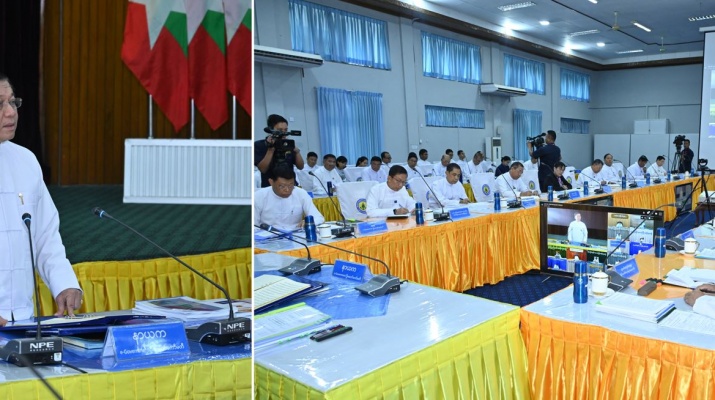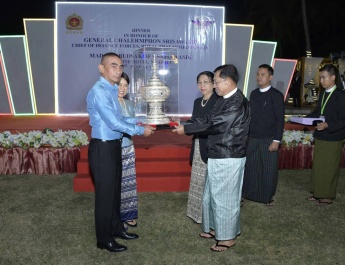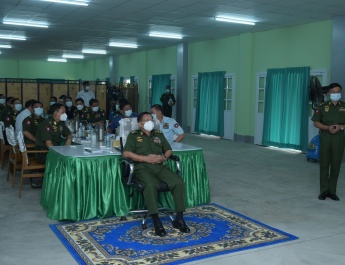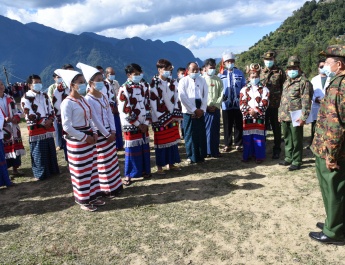Nay Pyi Taw July 26
The e-Government Steering Committee held a work coordination meeting 1/2024 at the meeting hall of Ministry of Transport and Communication here this morning, addressed by Patron of the steering committee Chairman of State Administration Council Prime Minister Senior General Min Aung Hlaing.
Present at the meeting together with the Senior General were SAC Joint Secretary Lt-Gen Ye Win Oo, Chair of the steering committee SAC member Deputy Prime Minister Union Minister for Transport and Communication General Mya Tun Oo, SAC member Lt-Gen Yar Pyae, union ministers, the Myanmar Computer Federation general secretary and officials. Region/ state chief ministers partici[1]pated in the meeting through video conferencing.
In his address, the Senior General said e-Government is the key pillar of establishing the digital economy, the main driving force of national economic growth. The task has become a must as it is much suppor[1]tive of the facilitation of the national digitization project.
Prioritization of e-Government strategic projects and functions will broaden the scope of technology in nation-building undertakings and management and administration. In addition, it will also engender good results and benefits, effectiveness and success in a short period.
Myanmar with the aim of achi[1]eving systematic ICT develop[1]ment adopted the first Myanmar ICT Development Master Plan in 2005 and second Myanmar ICT Development Master Plan in 2010. In 2016, Myanmar e-Governance Master Plan (2016- 2020) was adopted to accelerate the e-Government functions. Government organizations are implementing the e-Government functions contained in the master plans.
The country drafted the Myanmar e-Governance Master Plan 2030 after it had revised the e-Governance Master Plan (2016-2020) to meet the new policies of the government and rapidly advancing digital tech[1]nology. At its meeting held on 22 January 2024, the e-Government Implementation Committee decided to submit the draft to the steering committee for guidance. Hence, the meeting will discuss the topic.
Currently, in Myanmar, the government is providing services through platforms such as the Myanmar National Portal and the Myanmar National Trade Portal, as well as the individual websites of various government ministries, to ensure that the public can easily and efficiently access government information and services. Additionally, due to reforms in the telecommunications sector, ICT infrastructure has rapidly developed within a short period, and the use of mobile phones has significantly increased. The government is working to ensure that people across different areas can use government services through mobile telecommunications.
While the rapid development of technology brings benefits, it also leads to a noticeable increase in cyberattacks and cybercrimes. It is widely recognized that government organizations are facing greater challenges related to cybersecurity threats. Therefore, a cybersecurity policy was issued in 2023 to effectively implement cybersecurity measures. Moreover, efforts are underway to draft and enact a comprehensive cybersecurity law that includes guidelines and procedures to ensure cybersecurity in accordance with the law.
In Myanmar’s journey towards e-Government, significant milestones have been achieved. According to the UN e-Government Development Index (EGDI) released by the United Nations, Myanmar advanced from 169th place out of 193 member countries in 2016 to 134th place in 2022, marking a progress of 35 ranks. Similarly, by creating a governance model that allows the collaboration of both the government and the public, and ensuring that public needs, expectations, opinions, and suggestions are considered in decision-making processes, Myanmar has also improved its position in the UN e-Participation Index (EPI). It advanced from 170th place in 2016 to 117th place in 2022, showing a remarkable improvement of 53 ranks.
Transitioning to a digital economy and digital government presents administrative and economic challenges. To meet these challenges and fulfill expectations, it is crucial for government operations and practices to adapt to modern standards. Without such adaptations, there could be issues with the quality of services, insufficient funding, and losses in resources and economic opportunities. Therefore, it is essential for all departmental organizations to work together in unity.
It is necessary to prevent activities that are being carried out independently without colla[1]boration and coordination with other organizations. Government departments must use systems and technologies that allow mutual connectivity and collaboration, sharing ICT infrastructure and information.
Projects such as the e-Government Data Center, Myanmar National Portal, One Map Myanmar Geo Portal, Government Cloud, Government e-Mail, and e-ID, which were established for shared use among all government departments, are significant examples of enhancing government efficiency and information security.
As online activities expand, the use of electronic methods and banking operations, such as digital payments, money transfers, bill payments, and the transmission of financial information, has increased. However, this also brings challenges related to legitimacy and accountability. Additionally, to protect important and sensitive information from be[1]ing lost or damaged, it is necessary to establish backup systems and disaster recovery systems.
In building e-Government systems, many resources are needed including human resources, financial resources and natural resources. The steering committee is required to guide and supervise government departments to utilize and share necessary resources and increase the potentials of success of projects being implemented. The steering committee is also required to strongly support transparency, information sharing, availability of skilled human resources and cooperation.
In the world today, it can cle[1]arly be seen that countries that can successfully implement have achieved progress speedily. Economic development of a country depends on its ability to provide more comprehensive, safer and more reliable digital services. As a digital government must be able to look forward to digital capabilities and digital maturity, it is necessary to improve the image of e-Government, which has been implemented for previous decades and keep abreast of other countries. Therefore, everyone is urged to exert efforts to reduce the threat of digital technolo gies against individuals and the society to grasp intended digital opportunities and to improve people-centered e-Government services without losing sight.
Then, Chairman of the e-Government Steering Committee Union Minister General Mya Tun Oo reported to the Senior General on introduction of e-Government in Myanmar, cooperation of EDMS systems among ministries for development of the e-Government system and expansion of internet services, formation of the e-Go[1]vernment Steering Committee at the national level, adoption of Myanmar e-Government Master Plan 2030 for development of e-Government, training and nurturing staff who are well-versed in technologies, measures taken for information security and implementation of Myanmar Unicode system, enactment of the cyber security law, future tasks for development of e-Government system, measures taken to provide better digital services to the people, measures taken for availability of information in real time and tasks to be carried out by the steering committee for admini[1]strative, social and economic development of the country and socioeconomic development of the people.
Afterward, Secretary of the steering Committee Deputy Minister for Transport and Communications U Lu Mon reported to the Senior General on implementation of development of the e-Government system.
Then, members of the steering committee reported to the Senior General on implementation of tasks for e-Government development in respective sectors. The Senior General gave instructions on nurturing skill staff who are well-versed in technologies in respective ministries, cultivating human resources in technical schools, implementation of e-Government systems in ministries, tasks to be carried out for communication among ministries, regions and state through the e-Government system, preparations for information security in implementing tasks and other necessary instructions.
Then, the meeting was held according to the agenda and came to a close with concluding remarks by the chairman of the steering committee.





